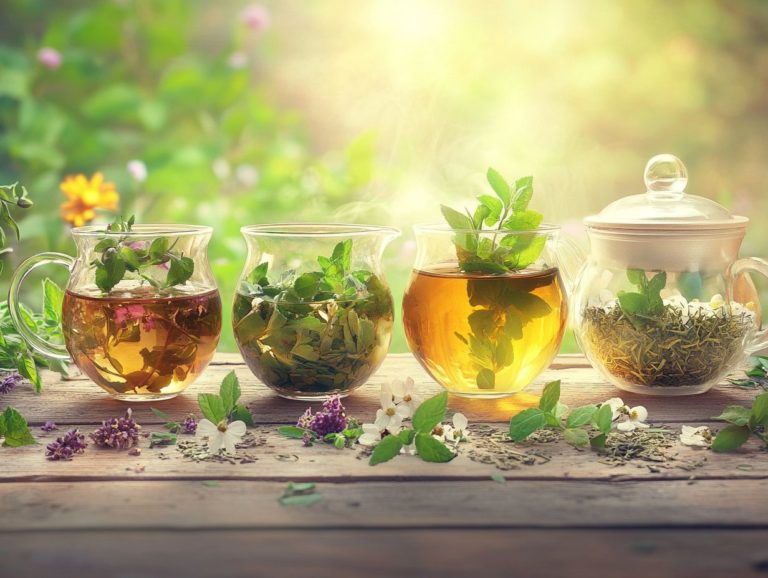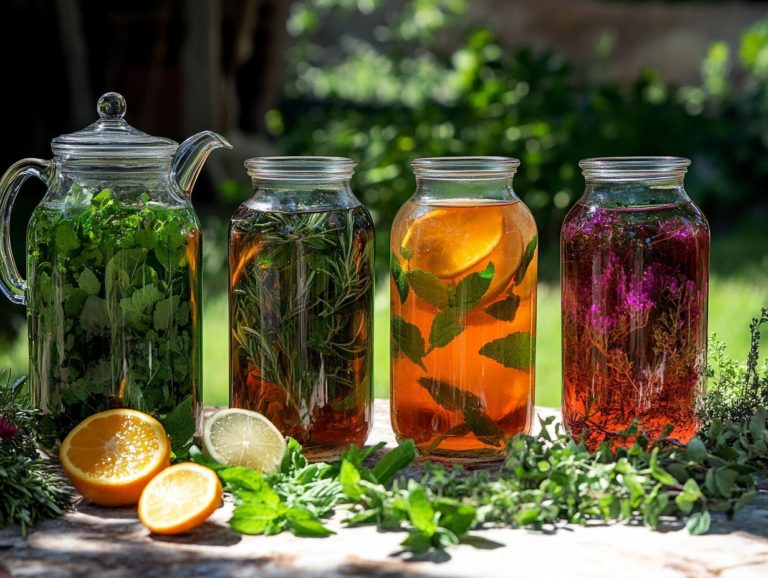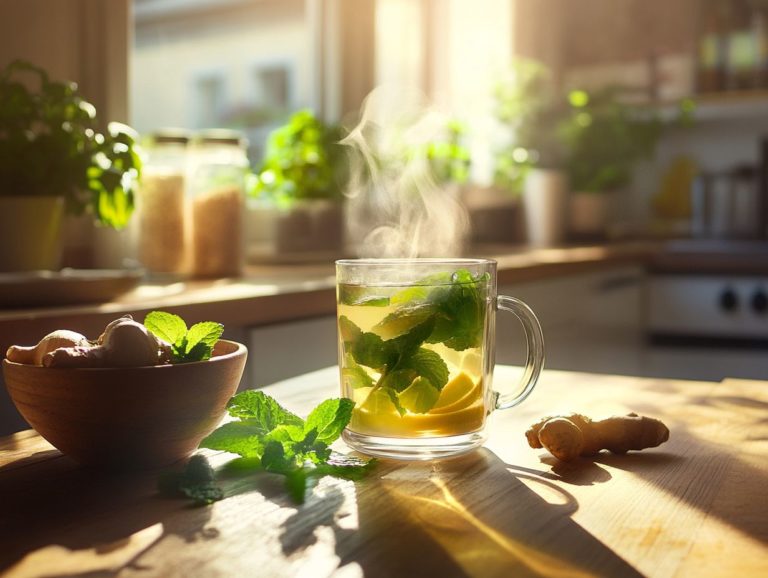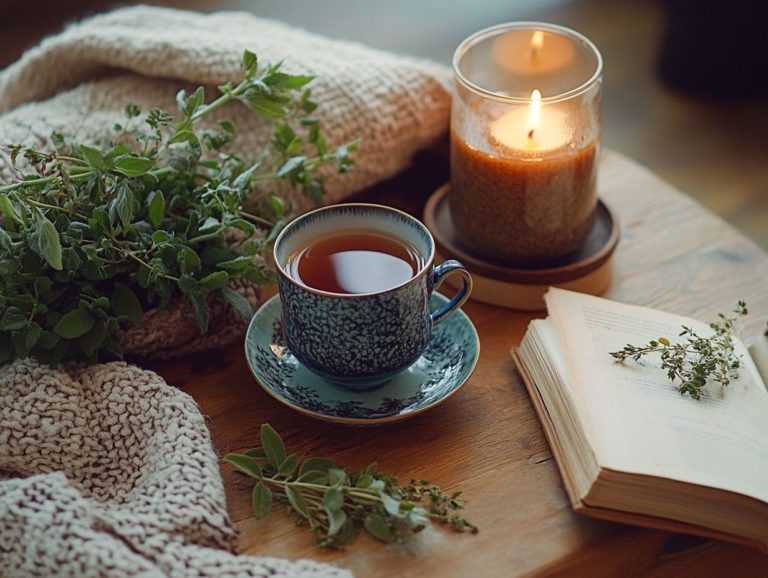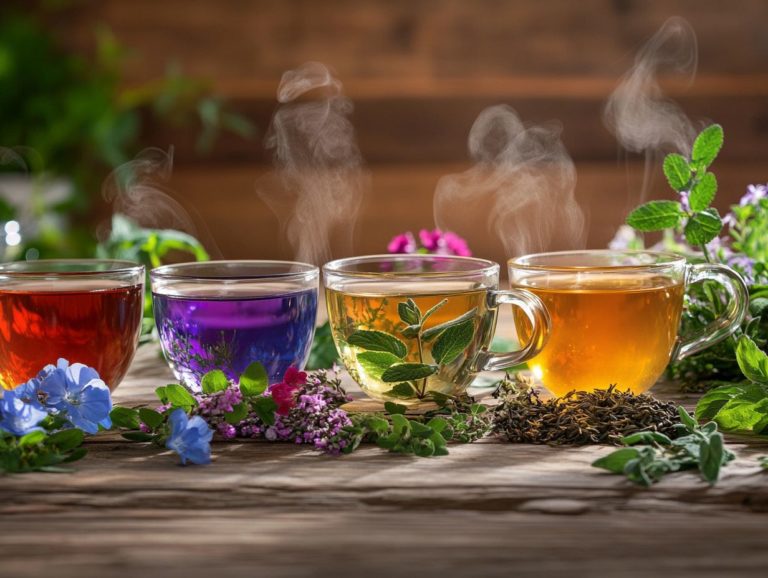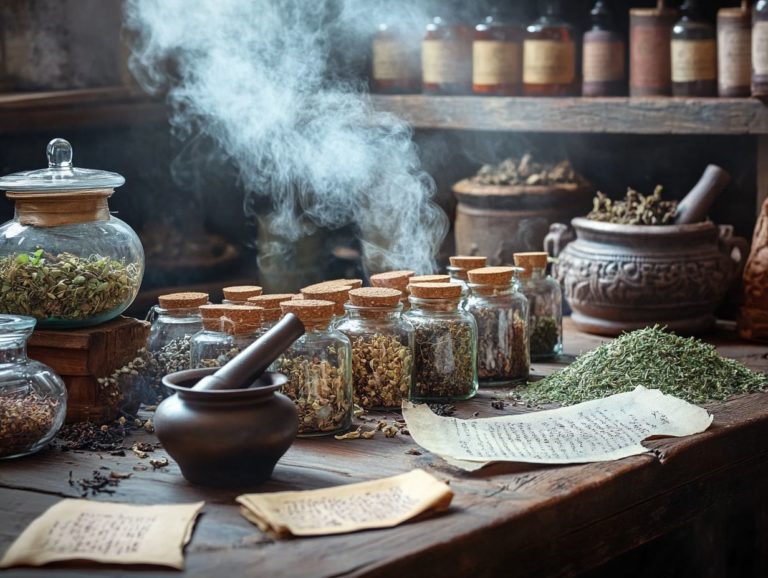5 Herbal Teas for Relaxation and Calm
In today s fast-paced world, you may find it challenging to carve out moments of calm. Herbal teas have emerged as a soothing remedy, providing natural ways for you to unwind and encourage relaxation.
This article delves into five remarkable herbal teas Chamomile, Lavender, Lemon Balm, Passionflower, and Valerian Root each celebrated for their calming properties. You ll explore their benefits, how they promote relaxation, potential side effects, and tips for seamlessly incorporating these soothing brews into your daily routine.
Discover how these herbal wonders can elevate your well-being and infuse a sense of serenity into your day!
Contents
Key Takeaways:
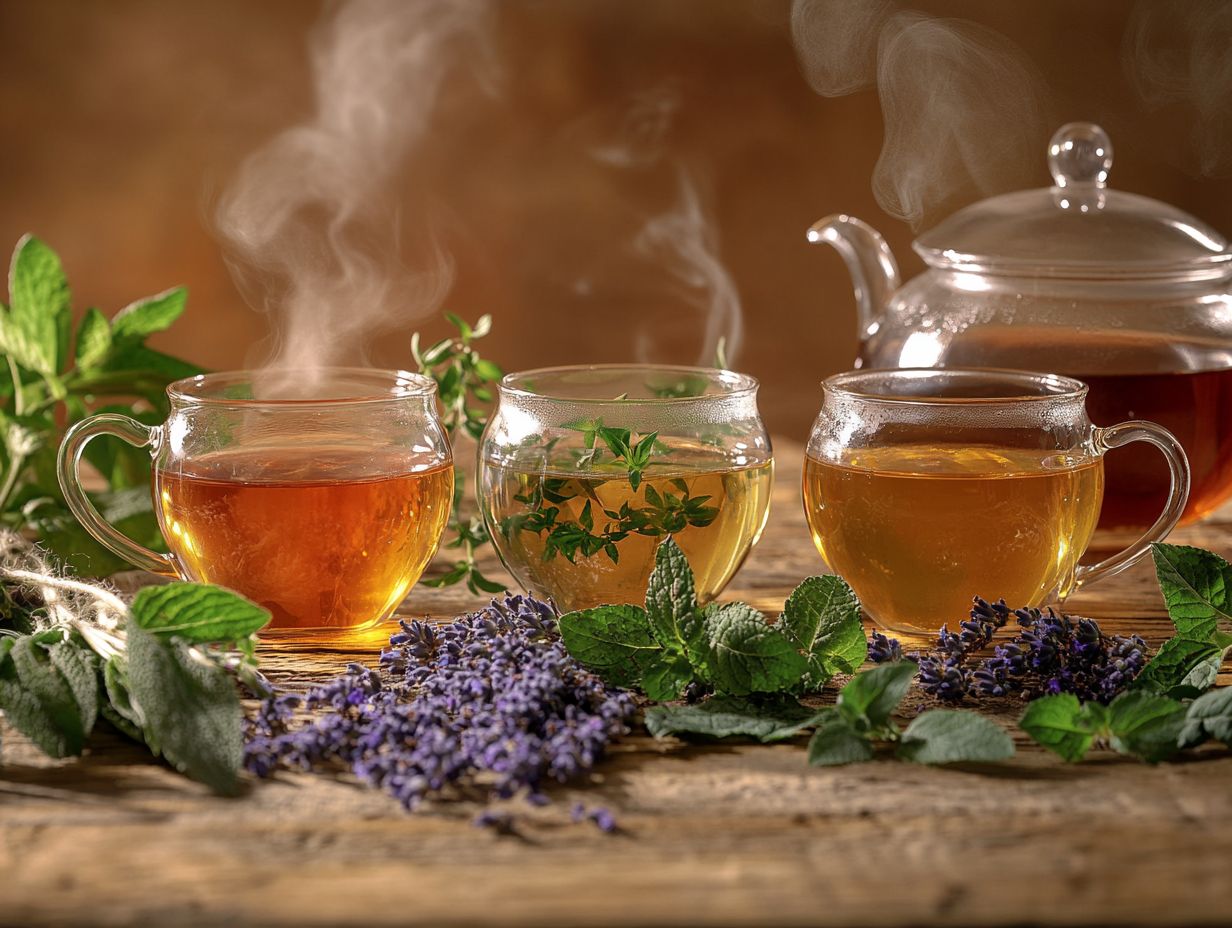
- Chamomile tea is a natural way to reduce stress and promote relaxation, thanks to its calming and soothing properties.
- Lavender tea is a great choice for those looking to unwind and relax, as it helps to reduce anxiety and promote a sense of calmness.
- Lemon balm tea is a delicious and effective herbal remedy for relaxation, known for its ability to reduce stress and improve mood.
1. Chamomile Tea
Chamomile tea, derived from the delicate Chamomile flower, is your go-to elixir for remarkable anxiety relief and soothing effects. It s not just another beverage; it s a natural way to feel better, perfect for those moments when you need to unwind after a long day.
Whether you savor it warm before bedtime or enjoy a soothing cup throughout the day, chamomile tea provides a delightful escape for both body and mind, securing its place as a therapeutic choice among popular herbal selections, especially when considering soothing chamomile tea for better sleep.
Dating back to ancient Egypt, chamomile has been lauded for its healing properties, serving as a natural remedy for a variety of ailments. Its gentle nature not only alleviates anxiety but also promotes restful sleep and aids digestion.
Among the many varieties, Egyptian Chamomile shines for its potent calming effects, often celebrated for its higher essential oil content. You can enjoy this versatile tea on its own or elevate it with flavors like honey, lemon, or mint.
If you re looking for an invigorating twist, why not craft a chamomile iced tea blend with fresh fruits? It makes for a perfect refreshment on warm days while still embracing all those soothing benefits.
2. Lavender Tea
Lavender tea, with its enchanting floral aroma and calming effects, offers a soothing herbal experience that many turn to for relaxation and anxiety relief. Its roots delve deep into ancient cultures, where lavender was cherished not only for its delightful scent but also for its role in traditional medicine.
Lavender promotes tranquility and enhances overall well-being. As you explore lavender tea, you’ll discover that its health benefits go beyond mere relaxation. This infusion is packed with antioxidants that support digestion and improve sleep quality. For a delightful experience, consider trying 5 delicious herbal tea blends that can enhance your wellness journey.
For a truly harmonious cup, consider blending lavender with chamomile or peppermint, amplifying its soothing properties. With a wealth of simple recipes at your fingertips, including ginger tea and rose tea, you can craft the perfect blend tailored to your taste. Additionally, exploring herbal treatments for anxiety relief can make lavender tea a delightful addition to your evening ritual.
3. Lemon Balm Tea
Lemon balm tea, crafted from the soothing lemon balm herb, is a delightful herbal infusion celebrated for its calming effects and potential to alleviate anxiety symptoms and digestive issues.
This gentle brew offers a warm embrace that can help soothe a restless mind while serving as a natural remedy for promoting sleep. You might find that incorporating this herbal tea into your evening routine, perhaps about an hour before bedtime, enhances your relaxation and leads to a more restorative night. For more options, explore these delightful DIY herbal teas for wellness.
Beyond its tranquil qualities, lemon balm tea can also support your digestive health, making it an excellent companion after meals. To fully savor its myriad benefits, consider adding a touch of honey or a slice of lemon to elevate its flavor and enhance its health-promoting properties.
Try these teas today for immediate relaxation benefits!
4. Passionflower Tea
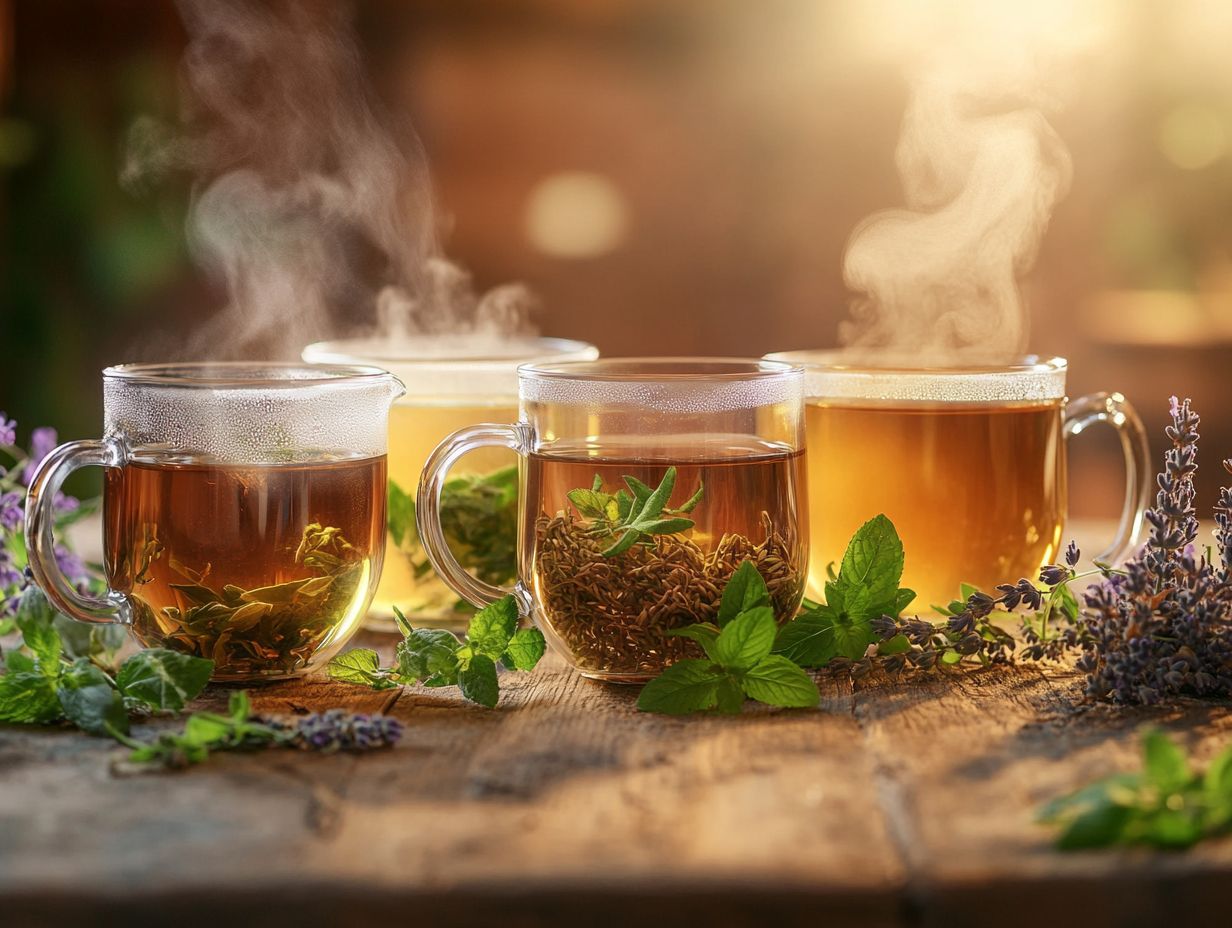
Passionflower tea, derived from the vibrant passionflower plant, is celebrated for its remarkable relaxing effects and is very effective at reducing anxiety. It has earned a special place among wellness enthusiasts who appreciate its calming nature.
This tea is not just known for promoting relaxation; it also contains many antioxidants and beneficial compounds that support overall health and well-being. Additionally, some may find that herbs for relieving stress-induced tension can enhance its effects. As you sip this soothing beverage, you’ll delight in the floral notes that elevate your sensory experience.
Preparing passionflower tea is easy, and it s worth every minute! Simply steep a teaspoon of dried passionflower in hot water for about 10 minutes, allowing its beneficial compounds to fully infuse. You might even want to enhance its calming effects by blending it with other soothing herbs like chamomile or lemon balm. This creates a serene herbal concoction that encourages tranquility and restful sleep.
5. Valerian Root Tea
Valerian root tea, sourced from the roots of the valerian plant, is celebrated for its remarkable calming effects and serves as a trusted natural remedy for anxiety and sleep disorders.
This herbal tea has a fascinating history that stretches back to ancient Greece and Rome, where it was commonly used to combat insomnia and foster relaxation. For centuries, herbalists and practitioners from various cultures have lauded its effectiveness in reducing stress levels and enhancing overall well-being. If you’re looking for more options, consider exploring 5 must-try herbal preparations for better sleep.
Valerian root tea also helps contribute to digestive health and alleviate tension headaches. To prepare this tranquil brew for maximum impact, steep one to two teaspoons of dried valerian root in hot water for about ten minutes. For added benefits, consider exploring 5 must-try herbs for stress management. Allow the enchanting aroma to envelop your senses, gently guiding your mind toward a state of serenity.
What Are the Benefits of Herbal Tea for Relaxation and Calm?
Herbal teas present a wealth of benefits for relaxation and calm, offering everything from stress relief to soothing effects for both body and mind. Incorporating them into your wellness practices can be transformative.
Take chamomile tea, for example. It’s renowned for its calming properties, often helping you drift into sleep and reducing anxiety after a chaotic day. Lavender tea, with its delightful floral aroma, not only pleases your senses but also alleviates stress, promoting a profound sense of tranquility. Then there’s peppermint tea, which can elevate your relaxation by easing muscle tension and aiding digestion. For more natural solutions, check out the top 5 DIY herbal remedies for stress relief.
Each of these therapeutic brews is infused with unique compounds that enhance mental well-being, encouraging a harmonious balance in your daily life.
How Do These Teas Promote Relaxation and Calmness?
Herbal teas are your ticket to relaxation and calmness, thanks to their unique blend of soothing herbs that work wonders in alleviating anxiety symptoms and promoting mental wellness.
One standout ingredient you ll often encounter in these blends is L-theanine, a gem found in green tea. This amino acid boosts levels of calming neurotransmitters like GABA, serotonin, and dopamine, helping you find stress relief without any drowsiness. Then there s chamomile, celebrated for its anti-inflammatory properties. It works by binding to the same brain receptors as certain anti-anxiety medications, creating a soothing sense of tranquility.
For an extra dose of relaxation, try this delightful tea recipe: steep chamomile flowers with a teaspoon of dried lavender buds in hot water for 5-7 minutes. This lovely mix makes a fragrant tea that eases tension and boosts your well-being.
Which herbal tea will you try first?
What Are the Possible Side Effects of These Herbal Teas?
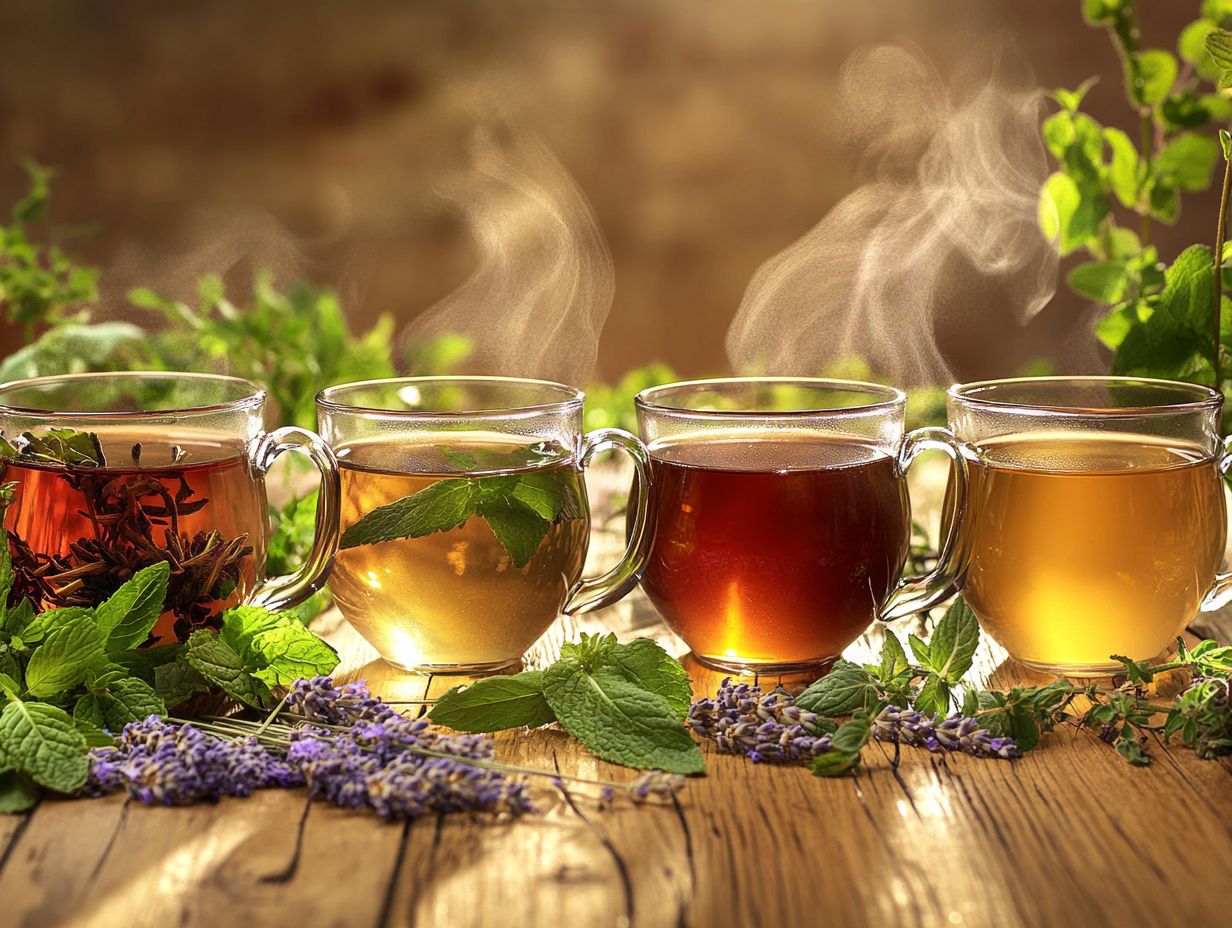
While herbal teas are generally considered safe, it’s important for you to be aware of potential side effects and contraindications, especially if you have specific health conditions or sensitivities to certain herbal ingredients found in various blends.
Some people experience digestive issues like bloating or nausea after herbal blends such as peppermint or chamomile. Certain herbal teas can also interact with prescription medications, particularly those affecting blood pressure or blood sugar levels, leading to unintended consequences. This makes it crucial for anyone who is pregnant, nursing, or has existing health concerns to be careful.
If you notice any unusual symptoms or are uncertain about how herbal teas may interact with your medications, seeking advice from a healthcare professional is a prudent step for personalized guidance.
How Can One Incorporate Herbal Tea into Their Daily Routine for Relaxation?
Adding herbal tea to your daily routine can be a simple yet powerful way to relax and boost your health.
By designating specific times for tea breaks, you can transform moments of stress into valuable opportunities for relaxation and mindfulness. For instance, savoring a cup of chamomile tea during your morning pause can set a serene tone for the day ahead. Additionally, incorporating herbal bath recipes for relaxation in the evening can enhance your wind-down routine. Indulging in a soothing peppermint blend in the afternoon can provide a refreshing lift amidst your busy schedule.
Pairing your tea time with mindful practices, such as deep breathing or gentle stretching, elevates the experience. These rituals can cultivate a profound sense of calm in an often hectic world. Additionally, incorporating the top herbs for managing stress effectively can enhance your relaxation routine. Start your tea rituals today and discover the peace it can bring!
What Are the Other Health Benefits of These Herbal Teas?
Beyond mere relaxation, herbal teas offer an impressive array of health benefits that enhance your overall wellness. They provide immune support, assist with digestion, and possess anti-inflammatory properties that truly make a difference.
Take echinacea, for example. It s renowned for boosting immune function, with numerous studies suggesting it may shorten the duration of colds. Then there’s peppermint tea, which not only refreshes your palate but also works wonders in alleviating digestive discomfort. Research has shown its effectiveness in soothing conditions like irritable bowel syndrome.
Ginger tea, celebrated in traditional medicine, boasts potent anti-inflammatory properties that can help relieve muscle soreness and joint pain. These herbal infusions do more than just warm your soul; they represent a rich blend of ancient wisdom and modern science, making them an essential part of your daily health regimen.
Are There Any Contraindications for These Herbal Teas?
Certain herbal teas carry contraindications that you should be mindful of, especially if you have existing health conditions or if you’re pregnant or breastfeeding.
Take chamomile tea, for instance it’s celebrated for its soothing properties, yet it may pose risks for individuals allergic to a group of plants that includes daisies and chrysanthemums or those on anticoagulants, as it can enhance their effects. Similarly, ginseng isn t without its complexities; it can interact with blood sugar medications and other prescriptions, making it essential for you to consult a healthcare professional before incorporating it into your routine.
Caution is also advised for various demographics, including the elderly, children, or those with compromised immune systems. Pregnant women, in particular, should be wary of herbal teas like raspberry leaf or peppermint, as their effects remain uncertain. This shows the importance of being careful with herbal remedies.
Frequently Asked Questions
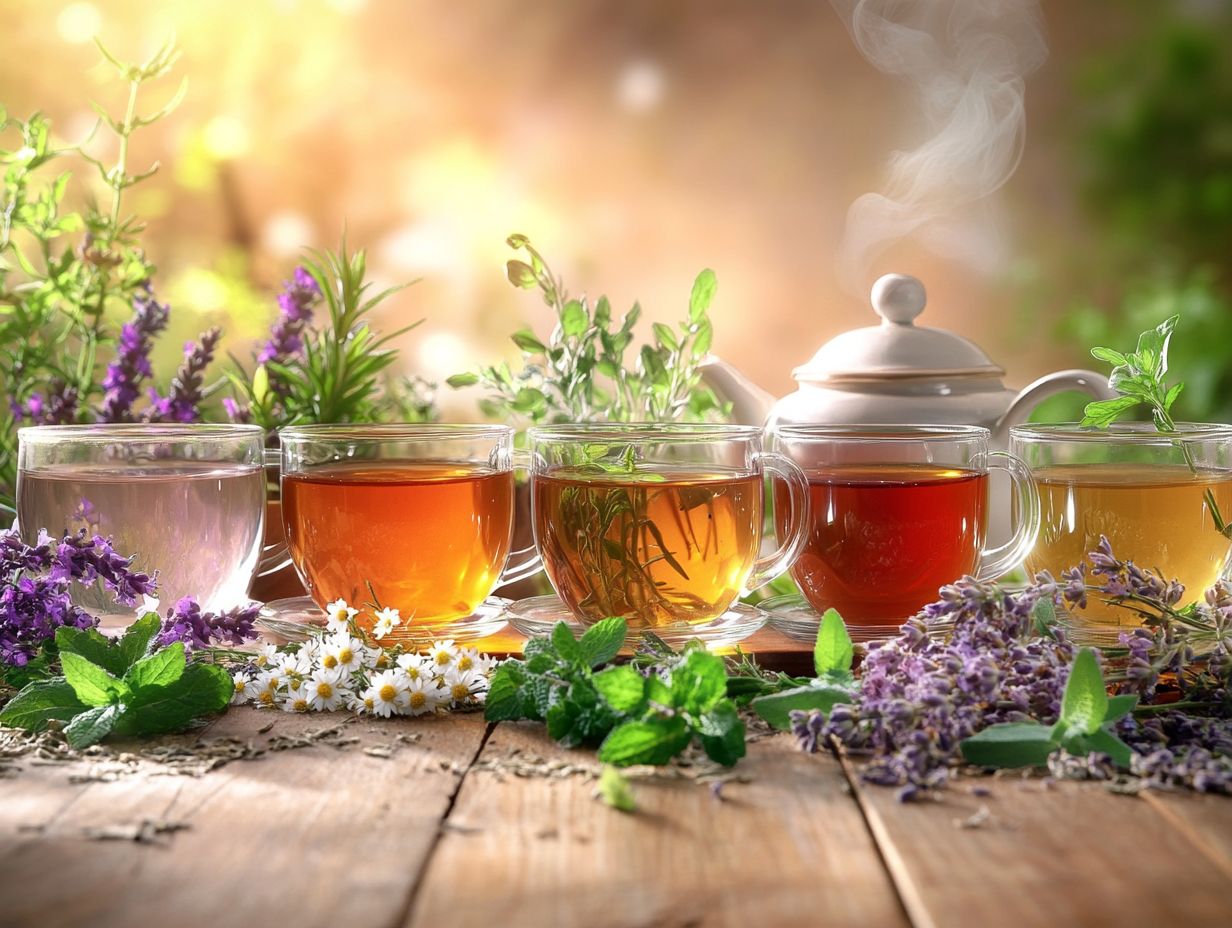
What are the 5 herbal teas for relaxation and calm?
The five herbal teas that promote relaxation are chamomile, lavender, passionflower, valerian root, and lemon balm.
How does chamomile tea help with relaxation?
Chamomile tea is a soothing wonder! It helps your brain feel relaxed by interacting with specific receptors.
Is lavender tea beneficial for relaxation?
Yes! Lavender tea is well-known for its ability to reduce anxiety and encourage restful sleep.
What are the benefits of drinking passionflower tea?
Passionflower has been used for centuries to tackle anxiety and insomnia. It s believed to calm the mind and body.
Can valerian root tea help with relaxation?
Yes! Valerian root is a popular natural sleep aid and can enhance your sleep quality.
How does lemon balm tea promote relaxation?
Lemon balm boosts GABA activity in the brain, which helps reduce anxiety. This makes it an excellent choice for calming your mind.

